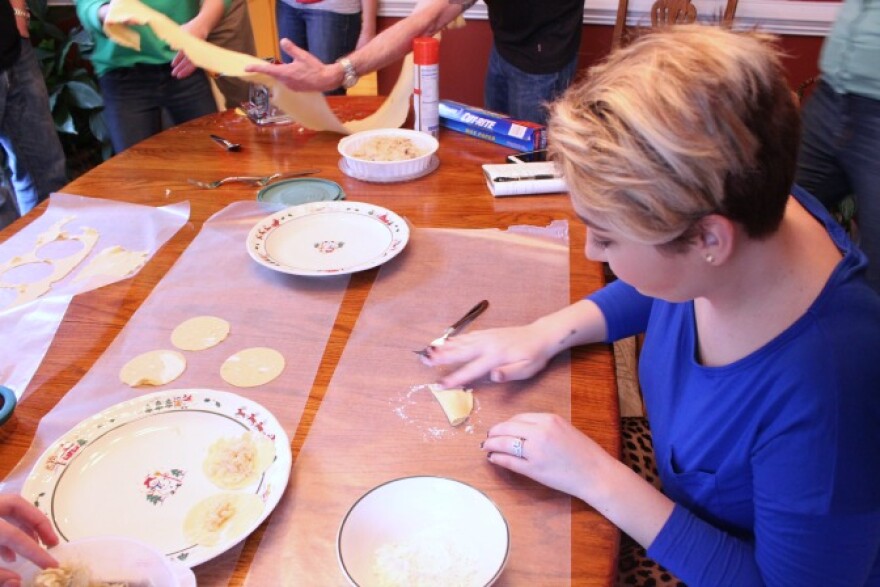When I met Ken Mezger, we were sitting in the finance office of a local car dealership finalizing the particulars of a new car purchase. He was filling out paperwork, making small talk. The conversation quickly turned to food (no surprise there) and a talkative Mezger shared the annual Christmas tradition he and his Polish-American wife create each year. Namely, a pierogi party.
Pierogis are a traditional Polish dumpling made of eggs, flour and salt. The dumplings are stuffed with a variety of fillings from savory mushrooms and sauerkraut to sweet fruit fillings. Every year, the Mezgers invite family and neighbors over to participate in the annual making of the signature crescent-shaped dumplings. They set up a makeshift assembly line and everyone leaves with a plate of the homemade pierogi while the Mezgers reserve their pierogi stash for Wigilia, or Christmas Eve. Wigilia means vigil and the largely Catholic Polish population observe this special time of the advent season, a time of waiting, with a number of traditions and special foods. In the Mezger home, the Wigillia meal consists of halibut, prunes, split peas, borscht with Polish sausage and horseradish, challah bread with honey and pierogi, of course.
A few days before Wigilia, I traveled to the Mezger’s Mooresville home where I was greeted by Ken, his wife Melissa and their two daughters Taylor, 20 and Kayleigh, 23. Inside were neighbors and family friends ready for the annual festivities. Melissa Mezger is one of seven children who grew up in Buffalo, New York where her father, Walter Gmerek, originally from Krakow, passed on the tradition of making pierogi each year to his children.
“My sisters are probably making them right now too,” said Melissa.

Armed with a simple recipe sketched by his father-in-law, Ken Mezger makes the dough for the pierogi. It’s a simple ratio of eggs, water and flour and, after 26 years of marriage, Ken is seamlessly indoctrinated into Polish tradition. Ken is gregarious and chatty, telling me all about his wife’s family with the detailed accuracy of a doting husband. He works the dough with his hands, intuitively feeling the consistency until the first round of dough is ready for the pasta maker.
“You find out whether your dough is the right consistency when you roll it out. It’ll crack or fall apart if it’s not right.” says Mezger.
The dough is rolled out three separate times under three different settings on the pasta maker.
“6, 4, 2” says Ken, “that’s what my father-in-law wrote here,” as he points to the crumpled sheet of paper.
The family heads to the dining room where an assembly line is set up on the dining room table. The pasta maker sits at one end and several sheets of parchment paper line the table to hold the long sheets of dough that will be laid out. A container full of mushroom filling and another with a mixture of sauerkraut and onions sit in the center of the workspace.
Ken begins cranking the dough through a pasta maker to flatten the dough into sheets. Taylor Mezger quickly blurts out, “This is my favorite part. I used to do this with my grandfather, sitting on his lap.”

Ken cranks the dough while Melissa Mezger gently cradles the dough as it comes out, flattening and lengthening into a wide sheet, longer than an arm’s length. Together, husband and wife lay the dough onto the parchment runners and Taylor Mezger begins cutting out circles of dough to send down the assembly line. The neighbor girls, Kate Hoffman and her sister, Sarah, begin dolloping spoonfuls of filling onto each circle. Kayleigh Mezger completes the pierogi by folding the circle in half, lightly dusting the stuffed crescent with flour and sealing it with the tines of a fork.
Melissa Mezger whisks plates full of pierogi into the kitchen to drop into boiling water where they will boil until they float. She collects the scraps of dough left over and lays them out to dry on separate table. They will become noodles for another dish. Frying the pierogis is usually saved for Christmas Eve, but Melissa makes an exception so that I can taste them. She browns them in butter and serves them hot. The end result is a deeply comforting, buttery dumpling that is crisp on the edges and filled with a soft, savory center.
At Christmas Eve dinner, the Mezgers will share the oplatek, a large unleavened wafer similar to a Communion wafer, passed from eldest to youngest as a symbol of the Christmas blessing. Beneath each plate will rest a one dollar bill symbolizing prosperity for the coming year. Then they will feast, enjoying the pierogi that comes only once a year.
After leaving that day, I received several text messages from Melissa Mezger. One was a picture of her father in Tennessee making pierogi with his granddaughters in almost identical time with her pierogi party in Mooresville. Next, she received a text from her brother-in-law making pierogi with his son in Savannah, Georgia.
How sweet it is to feel connected to one’s family across the miles through the simple act of making food. If that’s not tradition in action, I don’t know what is.












